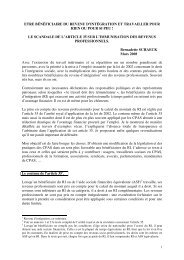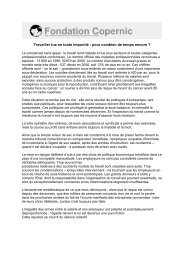Awra Amba RJ 300612 EN - Contacter un comité local d'Attac
Awra Amba RJ 300612 EN - Contacter un comité local d'Attac
Awra Amba RJ 300612 EN - Contacter un comité local d'Attac
You also want an ePaper? Increase the reach of your titles
YUMPU automatically turns print PDFs into web optimized ePapers that Google loves.
<strong>Awra</strong> <strong>Amba</strong>, a current experiment of utopian socialism<br />
The nursery school is open to all, but welcomes only children from the village (Yi07/61; Crespo,<br />
2012). That is not surprising according to Yi07/61, because the parents from the neighbouring<br />
villages do not want their children to be educated according to the <strong>Awra</strong> <strong>Amba</strong> principles.<br />
All children would go to nursery school between the ages of 3 and 7 (Jo10b/6), even from the age of<br />
2 (Crespo, 2011) <strong>un</strong>til the age of 5 or 6 (Yi07/4). However, it should be in 2010 aro<strong>un</strong>d 15 children<br />
for each year of age, when we take into acco<strong>un</strong>t the 119 children <strong>un</strong>der 10 recorded by Atnafu in<br />
2005 and the increase of the population from 364 to 412 people in 5 years; Yirga (2007/73) states<br />
however that only 6 children entered the first level of school in 2006-2007. Therefore, it should be<br />
aro<strong>un</strong>d 45 children between the ages of 3 and 5, aro<strong>un</strong>d 75 children between the ages of 3 and 7 and<br />
aro<strong>un</strong>d 90 children between the ages of 2 and 7; these figures are much higher than the number of<br />
children – about 20 – present in the nursery school a day of April 2010 according to Jo10b/6, as two<br />
years later (Crespo, 2012) (see Picture 14). It is therefore clear that children are far to go to nursery<br />
school every day, or that all children go to this school (Question 33 in Annex).<br />
Picture 14: Kindergarten a Thursday afternoon in April 2010.<br />
Moreover, the comm<strong>un</strong>ity planned in January 2011 to create a care service for the very yo<strong>un</strong>g<br />
children <strong>un</strong>der two, who today accompany their parents to work in the fields or in the weaving<br />
workshop, which is very noisy and whose many machines are not protected; this service is still not<br />
created in 2012 (Crespo, 2011; 2012).<br />
According to Yi07/94, the peer education and especially the kindergarten encourage ethnocentrism<br />
of children: children receive an education, to his mind, too centred on the comm<strong>un</strong>ity values and<br />
principles, which makes them reluctant to discover other cultures (Yi07/ii). However, if the values,<br />
principles and behaviours of the <strong>Awra</strong> <strong>Amba</strong> comm<strong>un</strong>ity are considered by <strong>Awra</strong> <strong>Amba</strong> children<br />
(and adults) much higher than those of the traditional Amhara society, the reverse could also be true,<br />
when looking at many examples of distrust of <strong>Awra</strong> <strong>Amba</strong> by neighbours and especially by the<br />
children, reported by different authors. We do not see how the <strong>Awra</strong> <strong>Amba</strong> comm<strong>un</strong>ity could survive<br />
in a hostile environment without asserting its values and educating its children while respecting its<br />
values. Nevertheless, other cultures are very far to be limited to the culture of neighbouring<br />
comm<strong>un</strong>ities, even to the Amhara culture. If one of the goals of the kindergarten is to help children<br />
to remove from their family cocoon and to open to a more complex environment (Kendal, 1983), the<br />
<strong>Awra</strong> <strong>Amba</strong> kindergarten could, even ignoring hostile close cultures, open up to the world. Yirga<br />
asserts it is not the case (Question 34 in Annex).<br />
The comm<strong>un</strong>ity built its first library in 1997, no longer used but preserved as witness of the past. A<br />
64 / 85

















